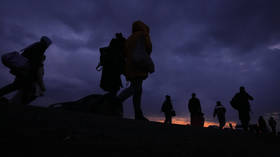Impact of refugee exodus on Ukraine’s demographics evaluated

The population of Ukraine might decrease by up to five million people if the military conflict with Russia becomes protracted. The warning was issued by Ella Libanova, director of the Ukrainian Institute of Demography and Social Research, who said many refugees might remain abroad permanently.
Speaking during a national TV marathon, Libanova said that the main factor for the country’s demographics now is the duration of the “hot phase” of the Russian offensive.
“If it is over by the end of the year, I think that we will lose about 500,000 – 600,000 people. It’s a lot, but not a disaster. If the hot phase of the war lasts, say, 2 years, then it could be up to five million,” Libanova said, adding that the longer war lasts, the more people will leave.
In her opinion, when the restrictions on departing the country imposed on men aged 18-60 are lifted, “family reunification will take place not in Ukraine, but abroad.”
The situation with internal migration is even more complicated, the demographer said. She claimed that even when the military conflict is over, people will be aware of the fact that Russia remains an “aggressive neighbor.” Therefore, she argued, families and businesses might choose not to return to the regions close to the Russian border.
“Therefore, I am not convinced that we will be able to restore the pre-war distribution of the population {and} business,” she said.
Earlier this month, Libanova proposed a set of measures which, in her opinion, the Ukrainian government should take in order to minimize the impact of the conflict on the country’s demographic situation. Most important, she stressed, is for the state to maintain contact with those who have left by providing them with opportunities to work and study remotely.
She also warned that Ukraine should not expect a baby boom immediately after the end of the conflict.
“Children will be born only when there is a rapid increase in living standards and improvement in quality of life, when there are living conditions for parents. But this will not happen immediately after the war,” she said.
Earlier this month, Ukrainian President Volodymyr Zelensky said that approximately 12 million Ukrainians had left their homes since the beginning of the Russian operation.
According to the United Nations High Commissioner for Refugees, as of June 21, nearly 5.3 million refugees from Ukraine have been registered for national protection schemes in Europe. However, the total number of Ukrainians fleeing the country seems to be higher: the agency reports more than 8 million border crossings from Ukraine.
Prior to February, Ukraine’s population was estimated at 41.2 million people.
As Europe deals with one of the most serious migrant crises in modern history, Russian President Vladimir Putin warned the West in late March of a new influx of migrants, which, in his opinion, will “inevitably” follow the food crisis.













